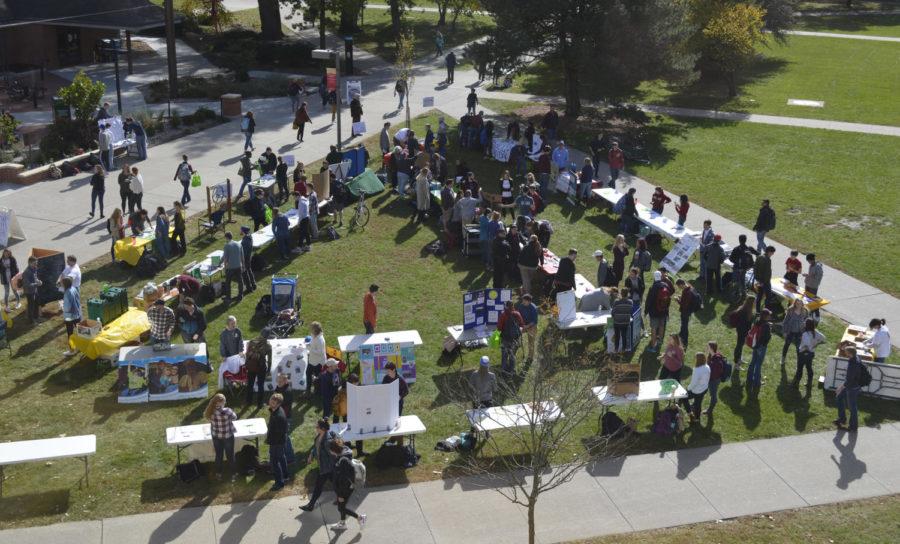‘Learning to be sustainable is not something you’re born with’
February 11, 2018
Sustainable living is not exclusive to people who care solely about environmental issues, according to three Iowa State sustainability advocates.
Lia Gomez, Aviana Pingel and Paige Myers are three students involved in campus sustainability organizations who feel living sustainably is for anyone who cares about taking responsibility for one’s impacts on the world, others and themselves.
Environmental impacts like waste, water and energy use, are all areas of life that can be made more sustainable for anyone, said Myers, campus and community engagement intern with the Iowa State campus sustainability initiative, Live Green.
“Sustainability encompasses a lot of different things,” Myers said. “It’s an overarching theme of a lot of different themes and facets. It encompasses environmental, social and economic factors.”
Maintaining healthy balances and an ability to recover from unbalances among these factors is a shared goal within the sustainability community on campus, Myers said.
Keeping social ties, saving money and protecting the environment from resource depletion and pollution are a few examples of how people achieve this goal, according to Pingel, co-president of ISU residency halls’ student sustainability club, The GreenHouse Group.
Self care is another facet that can be included among these factors, said Gomez, co-president of The Green Umbrella and director of sustainability for Student Government.
The importance in maintaining these balances comes from the benefits they bring to others and the individual, Gomez said.
“[People being sustainable] comes full circle, to benefit themselves. It doesn’t have to be an environmental aspect. Being sustainable goes far beyond that,” Gomez said.
As for how these students came to care about their balances and impacts, their experiences leading to sustainability advocacy differs.
Raised in Boone, Iowa, Myers’s background in sustainability comes from her high school experience attending the World Food Prize Iowa Youth Institute at Iowa State.
After a few years attending the event as a global youth participant, Myers said she discovered her interest in global environmental and agricultural issues, such as food insecurity and sustainability.
Aided by the context the World Food Prize Institute gave her on food scarcity and sustainable practices and with desires to travel internationally, she was then inspired to attend Iowa State and major in global resource systems and agriculture and society, with a minor in Spanish, Myers said.
Because of these interests, and a growing passion for environmental issues as well as event management, Myers later decided to leave her position as a community adviser to apply for the intern position with Live Green.
“On campus I struggled in finding people who were willing to change their lifestyles for sustainability. But [I’ve found] that clubs and organizations, and going to [sustainability] events, can be great for finding people like you that have those goals,” Myers said.
Pingel’s interest in understanding sustainability began in her childhood backyard in a suburb outside of St. Louis.
“We had these woods in our backyard, and I would explore [there] with my two sisters…we would go out there and see the younger parts of the forest… Once they knocked down the forest, when I was 12 or 13, there weren’t really any animals. So I was like, OK now I see what happens,” Pingel said.
From teeming with life to silent, the loss of her backyard getaway was a moment that stuck with Pingel as she went on to complete environmental courses in high school.
With more knowledge about how the world changes when natural systems are disturbed, Pingel decided understanding the impacts of people on the environment was something she wanted to pursue in college; inspiring her choice to double major in environmental science and global resource systems, Pingel said.
Today, along with advocating for sustainable living in The GreenHouse Group, Pingel also participates in The Green Umbrella (TGU).
For sustainability-curious students who want to learn more about how they can balance their social, economic and environmental impacts, getting involved in sustainability groups and attending club meetings is a great first step, Pingel said.
“With a lot of them, it’s not a huge commitment. You can just absorb information and leave. Also we have fun. The point of TGU is to engage people more in sustainability. We want to engage people in the stuff they want to do [socially, environmentally or economically],” Pingel said.
Like Pingel, Gomez developed her interest in sustainability after witnessing examples of how people impact and interact with the environment and other people. The first examples for her came from her grandmother, a nurse living on the border of Mexico, Gomez said.
“She worked in [a] delivery room where babies were born with a variety of [illnesses]… and somehow the conversation always came back to water,” Gomez said.
Hearing water quality could alter lives as a little kid was hard to wrap her mind around, Gomez said.
In high school, however, she began to grasp more fully the impacts, and causes, of poor water quality.
“[A professor in high school helped me complete a] water quality analysis on treated human waste water…and seeing the effect that the treated water had on the environment… I fell in love with my research. From sophomore to senior year, that was my baby. Water quality and the environment, and seeing how they worked together and affected each other,” Gomez said.
Coming to Ames from San Antonio, Gomez feels her city lens growing up was one that had not been as exposed to the environmental aspect of sustainable living, until after she embarked on understanding water quality, Gomez said.
One piece of advice Gomez would give to students looking to be more sustainable, is that they learn to see the products of their actions, and how they impact others, Gomez said.
“[Learning to be sustainable] is not something you’re born with. Everyone has a different experience,” Gomez said.







